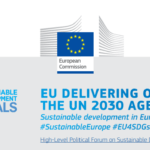The European Commission has today published new guidelines on corporate climate-related information reporting, as part of its Sustainable Finance Action Plan. These guidelines will provide companies with practical recommendations on how to better report the impact that their activities are having on the climate as well as the impact of climate change on their business.
The Commission has also today welcomed the publication of three new important reports by the Technical Expert Group on sustainable finance, including key recommendations on the types of economic activities that can make a real contribution to climate change mitigation or adaptation (taxonomy).
Valdis Dombrovskis, Vice-President responsible for Financial Stability, Financial Services and Capital Markets Union, said: “The climate emergency leaves us with no choice but transit to a climate-neutral economy model. Today’s new guidelines will help companies to disclose the impact of the climate change on their business as well as the impact of their activities on climate and therefore enable investors make more informed investment decisions. I also welcome the three reports by the Technical Expert Group, which are an important contribution to European policy-making and global debate on green finance.”
Today’s guidelines are part of the Commission’s ongoing efforts to ensure that the financial sector – private capital – can play a critical role in transitioning to a climate-neutral economy and in funding investments at the scale required. They will provide guidance to around 6,000 EU-listed companies, banks and insurance companies that have to disclose non-financial information under the Non-Financial Reporting Directive. They are inspired by recent proposals by the Technical Expert Group on sustainable finance (TEG), and integrate the recommendations of the Task Force on Climate-related Financial Disclosures (TCFD) established by the G20’s Financial Stability Board.
Also today, the Commission welcomes three important expert reports published by the TEG on sustainable finance:
- The first is a classification system – or taxonomy – for environmentally-sustainable economic activities. This aims to provide practical guidance for policy makers, industry and investors on how best to support and invest in economic activities that contribute to achieving a climate neutral economy. The group has extensively screened activities across a wide range of sectors, including energy, transport, agriculture, manufacturing, ICT and real-estate. It has identified low-carbon activities like zero-emissions transport but also transition activities like manufacturing of iron and steel in order to compile the most comprehensive classification system for sustainable activities to date. This expert report is published as the Commission’s proposal on taxonomy awaits agreement by the co-legislators.
- The second expert report on an EU Green Bond Standard recommends clear and comparable criteria for issuing green bonds. In particular, by linking it to taxonomy, it will determine which climate and environmentally-friendly activities should be eligible for funding via an EU green bond. The Commission expects this to boost the green bond market allowing investors to scale up sustainable and green investment
- Finally, a third expert report onEU climate benchmarks and benchmarks’ ESG disclosures sets out the methodology and minimum technical requirements for indices that will enable investors toorient the choice of investors who wish to adopt a climate-conscious investment strategy, and address the risk of greenwashing. The report also sets out disclosure requirements by benchmark providers in relation to environmental, social and governance (ESG) factors and their alignment with the Paris agreement. This expert report relates to the Commission’s proposal on low-carbon benchmarks, which has recently been agreed by the co-legislators.
Background
The TEG commenced its work in July 2018 and was composed of 35 members from civil society, academia, business and the finance sector. These reports are the outcomes of one year of extensive work on key aspects of the Commission’s Action Plan. These reports therefore supplement the legislative proposals on taxonomy and benchmarks presented by the Commission in May 2018. They aim to further incentivise and channel private sector investment into sustainable development, by making investors more aware of what they invest in and by giving investors important tools to invest sustainably.
On June 24, the Commission will host a stakeholder dialogue on climate-related reporting and the TEG reports. The event will be livestreamed on a dedicated event page. The TEG will conduct a call for feedback on the EU Taxonomy report and on the interim Climate benchmarks report.
The EU budget is also a driver of climate mainstreaming. To implement the Paris Agreement and the commitment to the United Nations Sustainable Development Goals, the Commission proposes to raise the level of ambition for climate mainstreaming across all EU programmes, with a target of at least 25% of EU expenditure contributing to climate objectives between 2021-2017.
More information
DG FISMA: sustainable finance – landing page
Factsheet on Sustainable Finance
Commission Guidelines on reporting climate-related information
Summary of the EC guidelines on reporting climate-related information
Technical Expert Group (TEG) – landing page
Summary of the TEG report on EU taxonomy
TEG report on EU Green Bond Standard
Summary of the TEG report on EU Green Bond Standard
TEG interim report on Climate benchmarks
Summary of the TEG interim report on Climate benchmarks







Leave a Reply